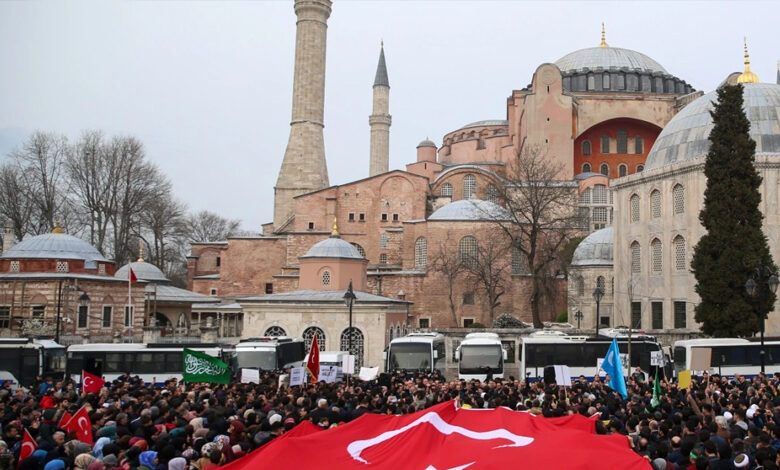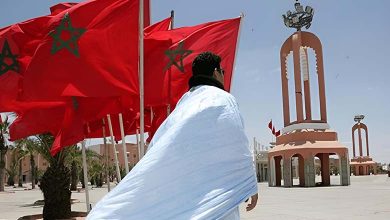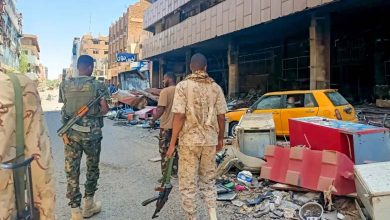
The impressive Hagia Sophia is an architectural masterpiece, UNESCO World Heritage Site, and certainly the most historic and symbolic building in Istanbul. For 85 years it served as a museum, it was a place for all, regardless of religion or whether they were attached to any religion at all. Now President Erdogan caused a worldwide stir when he announced that the Hagia Sophia would again become a mosque. First served as a Greek cathedral, the coronation church of the Byzantine emperor Justinian, was built in the 6th century. It is considered to be the “eighth wonder of the world. ” Its beauty inspired billions of visitors and brought people from all over the world together. Even when the Ottomans conquered Constantinople in 1453, Sultan Mehmed II demanded his troops not to destroy the Hagia Sophia. The Sultan is said to have climbed to the gigantic gold-plated dome the next day, not for a winning posture but to have watched with sadness the debris field and the destruction at the Hagia Sophia.
Atatürk, the first president of Turkey, evokes controversial reactions in 1934 when he suggested transforming the mosque into a museum. After 1453 the Hagia Sophia suffered the tragic fate of all the defeated: icons and crosses were destroyed, the altar and the Venetian bells disappeared, the mosaics of “Our Lady and the Saviour” were varnished. After the conversion into a museum, not only the Islamic history was shown but also the Christian heritage was made visible again: the throne-winning Mary with the Child Jesus in the lobby, in the main room the six-winged angels, a Christ Pantocrator, the archangels Gabriel and Michael. Of course, Atatürk’s act of degrading a house of worship into a museum can be seen as a brute.
Since then, however, so many believers, agnostics, and atheists have come together in peace, the old enmity between Islam and Christianity seemed to have been overcome, especially in the Hagia Sophia – or as its Greek name says: in divine wisdom. Whether President Recep Tayyip Erdogan’s step has now taken place in divine wisdom and has given his party the much-needed support will be shown. What is certain is that it is not a simple expression of religious attachment but a symbolic political expression of power, it is about the incorporation of an old loot, it also serves as a political form of pressure against the European Union regarding the way of handling the refugee’s crises at the Turkish-Greek borders. Erdogan has the power and the support within his rows, he can even use
symbolic places like the Hagia Sophia for his politics, covered in religious morality. The Supreme Administrative Court of Turkey has cleared the way for this, having annulled the decision of the Turkish Council of Ministers in 1934 which made the building a museum at the time. But if this really was a boost for his party the AKP and a way to gain back popularity within the country will show at the next election. Currently, his poll results are as low as ever and such a controversial step might not have been the best idea.
Even though nationalist and conservative Islamic groups have long regarded Istanbul’s landmark as a legacy of the Islamic-Ottoman Empire, calling for the transformation and complaining of “inappropriate behavior by tourists” in the Hagia Sophia.
With nationalistic ideals growing all over the world, a new peak of Islamophobia, and anti-ottoman symbolism in terror attacks, the narrative within Turkey shifted to a more conservative matter. The conversion of the historical monument can be read as another battle cry against the “others”, in particular against Europe.
Although Erdogan asserted: “Like all our other mosques, the doors of Hagia Sophia will be open to all, locals or foreigners, Muslims and non-Muslims”, he earned worldwide critical responses.
Politicians and church representatives in Armenia, Greece, and Russia also reacted unusually sharply. The UNESCO deeply regrets the decision, the Russian Orthodox foreign office chief spoke of a blow, Greece’s president of provocation, even the Pope complained to look at the Hagia Sophia “hurts” him. That is, regarding the Vatican etiquette, almost an outcry.
The controversial step above all does one thing: it evokes a huge sensation and at the same time distracts from the many other problems in Turkey, especially in times of Corona. The Hagia Sophia, the “Divine Wisdom”, is and remains a historical political, and cultural monument. Once again it is used but in a political matter: In fact, Erdogan’s decision to turn the Sofia Museum into a mosque is not much related to religious matters, but quite the opposite. The issue is purely political aimed at attracting more Islamic voices by tickling their religious feelings, trying to provoke Europe, and therefore polarizes between the different political camps. Furthermore, it is, at present, a symbol of Turkey’s state of democracy: from liberalization, from secularization, a further step towards a conservative Islamism, forced by dictatorial manners, or even a symbol of the “victory “ of such.
Wrote for I’m Arabic website Anna Gölz












